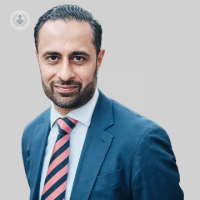By Dr Vinay Sehgal
Gastroenterology
Dr Vinay Sehgal is an award-winning, renowned consultant gastroenterologist and interventional endoscopist who sees patients at The London Clinic Consulting Rooms (Harley Street), The Riverside Clinic (West London) and University College Hospital London.
Dr Sehgal was on the North East London rotation where he completed his specialist training in gastroenterology, during which time he underwent a PhD from University College London. This is where he developed a novel tumour model of oesophageal cancer that is used in crucial mechanistic, imaging and pre-clinical studies. Dr Sehgal has received numerous awards for cutting-edge and landmark research in this field.
Dr Sehgal has a specialist interest in the treatment and early detection of gastro-oesophageal reflux disease (GORD). He offers a wide range of minimally-invasive endoscopic treatments for the condition, which includes the STRETTA procedure. Also, Dr Sehgal is only one of two UK specialists that offer endoscopic hiatus hernia repair using the trans-oral incisionless fundoplication (TIF) procedure as a minimally-invasive alternative to surgery, and to date, it has excellent outcomes.
Dr Sehgal also has a super-specialist interest in pre-cancerous conditions of the digestive tract, which includes squamous cell carcinoma (SCC) and Barrett’s oesophagus. He has assisted in the pioneering of, and is senior co-author of numerous landmark studies for, treatments of early oesophageal cancer. These treatments include endoscopic mucosal resection (EMR) and radiofrequency ablation (RFA).
He also looks after and treats patients who have more advanced oesophageal and gastric cancer, offering laser therapy and stent placement to improve their symptoms and quality of life.
Dr Sehgal also has a specialist interest in advanced endoscopic therapy for benign disorders of the foregut, which includes achalasia and eosinophilic oesophagitis (EoE).
Further to Dr Sehgal’s super-specialist and world-leading expertise in foregut disease, he also performs colonoscopy. During these procedures, he removes pre-cancerous polyps and assists in the diagnosis and treatment of inflammatory conditions of the bowel.
His complete set of expertise is below:
Areas of specialist expertise:
- Heartburn and acid reflux
Causes, consequences and treatments, such as lifestyle changes, proton pump inhibitors (PPI), and hiatus hernia-directed therapies.
Endoscopic diagnosis, which includes BRAVO capsule insertion and endoscopic reflux therapies such as STRETTA.
- Major upper gastrointestinal motility disorders
Investigation and endoscopic treatment of major motility disorders like achalasia and OGJ-outflow obstruction, with treatments such as Botox ™ and dilatation.
- Barrett’s oesophagus endoscopic therapy
Endoscopic removal (EMR) and ablation (RFA, APC, Cryotherapy) for early neoplasia and cancer that would otherwise require major surgery.
- Oesophago-gastric cancer
Endoscopic therapy, which includes stenting, laser and cryotherapy.
- Eosinophilic oesophagitis
Endoscopic diagnosis, which includes long-term dietary, medical and endoscopic therapies.
- Trans-nasal endoscopy
Transnasal endoscopy and minimally-invasive imaging, alongside monitoring the upper GI tract.
- Colonoscopy
Endoscopic treatment of pre-malignant colorectal lesions
Diagnosis of chronic lower gastrointestinal inflammatory disorders, which include Crohn’s disease and ulcerative colitis.
Endoscopic treatment of colonic strictures which may otherwise require surgery.
- Functional gastrointestinal disorders
Irritable bowel syndrome, cyclical vomiting syndrome, and disorders of the gut-brain axis.
- Small intestinal bacterial overgrowth
Investigation and novel lifestyle modifications, done in combination with medical therapies.
Research, publications and awards
Dr Sehgal led a team recently that introduced a non-invasive oesophageal tissue-sampling device. This was used to monitor patients with pre-malignant oesophagus conditions, instead of endoscopy, which was otherwise postponed due to the COVID-19 pandemic. University College Hospital London (UCLH) was the first centre in the world that adopted this technology alongside other centres, following its lead and ultimately assisting to improve care offered to patients.
He has a keen interest in endoscopy training and is a member of the British Society of Gastroenterology and Endoscopy Training Committee’s faculty, for the Royal College of Physicians. Dr Sehgal is also actively involved in several live endoscopy and hands-on training courses at UCLH.
Furthermore, he supervises a research team that collects important information about endoscopic techniques and procedures that he undertakes in order to ultimately improve and streamline patient care. Dr Sehgal’s work is focused on existing and novel endoscopy imaging technologies that help to detect and treat early cancer of the gastrointestinal tract. This includes the use of artificial intelligence. His other interests include the development of minimally-invasive endoscopic techniques in order to treat upper gastrointestinal tract cancers, and he is actively involved in several national and international clinical studies in the field.
Dr Sehgal is regularly invited to present at international meetings. He has also published various original manuscripts and reviews in this field.



